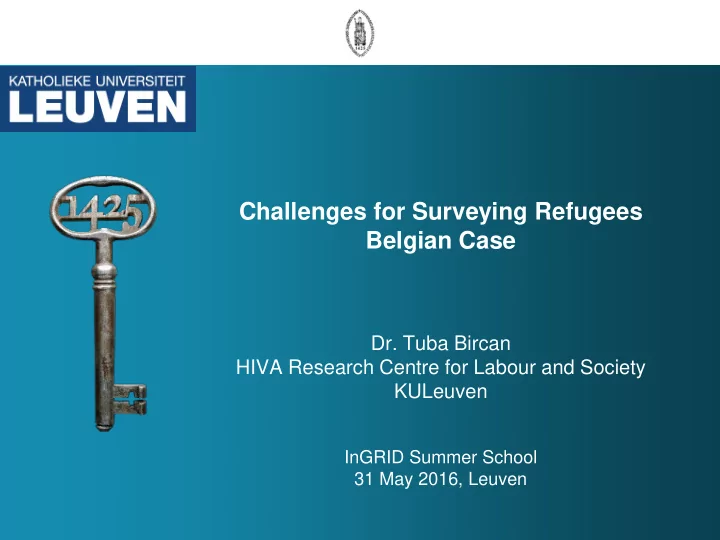

Challenges for Surveying Refugees Belgian Case Dr. Tuba Bircan HIVA Research Centre for Labour and Society KULeuven InGRID Summer School 31 May 2016, Leuven
Refugees in Belgium
Refugees in Belgium “ Nine member states in the EU today receive 90% of all asylum applications annually, but those nine states are starting to, well, become fed up. ” Tobias Billström, Sweden’s Immigration Minister, 3 March 2014 “ There are boundaries to everything — including how quickly we can create new spaces [for refugees] .” Theo Francken, Belgium’s Asylum and Migration Minister, 4 March 2015
Refugees in Belgium Number of registered refugees in Belgium (CGSV data)
Refugees in Belgium Country of Origin 2000-2004 2005-2009 2010-2014 2015 Total Russia 10.225 7.681 6.754 777 25.437 Afghanistan 2.307 3.852 10.065 7.099 23.323 Iraq 2.068 4.879 6.438 7.722 21.107 Serbia 10.950 4.286 3.514 201 18.951 Congo DR 7.830 4.080 5.048 650 17.608 Syria 1.113 1.222 4.467 7.554 14.356 Guinea 2.416 3.295 7.682 752 14.145 Iran 6.755 2.885 1.970 537 12.147 Armenia 3.035 2.986 2.651 187 8.859 Albenia 4.571 913 2.648 538 8.670 Kosovo 0 2.017 5.537 495 8.049 Turkey 3.887 1.626 1.526 229 7.268 Cameroon 2.307 1.813 2.274 318 6.712 Rwanda 2.847 1.837 1.739 230 6.653 Algeria 4.209 1.082 1.102 114 6.507 Slovakia 4.045 1.763 131 1 5.940 Pakistan 1.718 915 2.706 487 5.826 Georgia 2.534 1.193 1.720 248 5.695 Macedonia 1.648 564 2.847 209 5.268 Somalia 823 784 1.667 1.932 5.206 Bulgaria 2.975 846 229 7 4.057 Other 40.076 17.577 27.241 5.187 90.081 Total 118.339 68.096 99.956 35.474 321.865
Perception: Two-sided Coin What (Syrian) refugees know about and how they perceive the host Belgian community? What are their motivations for coming to Belgium? What do they expect from the society and the government in short and long term? Aim: Measuring refugees’ perception on Belgium as a host community and in terms of safety and security, access to services, future expectations from community and authorities
Refugee Survey Challenges 1. Best research method? • Hard-to-identify 2. Sampling strategy? • Hard-to-sample • Hard-to-contact • Hard-to-persuade 3. Questionnaire design? • Hard-to-interview 4. Broader generalisation?
Belgian Refugee Survey: Research method • Qualitative • Quantitative • Mixed method – Interviewing techniques • Focus groups • Open-ended, or semi-structured interviews • In-depth life history interviews – Quantitative assessments of attitudes
Belgian Refugee Survey: Sampling Challenges: • Clear sampling frame • Representativeness • RDS vs systematic sampling • Access problems
Belgian Refugee Survey: Sampling Challenges I: • Clear sampling frame 2011-2015 <14 14-17 Total Afghanistan 13% 25% 18,795 Iraq 16% 4% 14,980 Syria 24% 7% 15,920
Belgian Refugee Survey: Sampling Challenges II: • Representativeness –How to reduce selection bias?
Belgian Refugee Survey: Sampling Challenges III: • RDS vs systematic sampling –Sample size estimation •Refugee centers •In-town residents
Refugee Reception Centers in Belgium
Refugee Reception Centers in Belgium As of 24.05.2016: • Capacity: 35,764 plaatsen • Occupancy: 29,159 opgevangen personen • Occupancy Rate: 82% Occupancy Rate of Refugee Centers 100% 95% 90% 85% 80% 75%
Urban Refugees in Belgium Refugees often seek to conceal their identity, or act in ways that defy conventional data collection techniques (Bloch 2007;Vigneswaran 2009). Residential addresses: CGVS has the records for addresses of the refugees out of refugee centers. Trust issues: Fear of talking with others Religious issues: Hallal food, mosques
Belgian Refugee Survey: Sampling Challenges IV: • Access problems - Low response rates - Local assistants? “be in a better position to recognize and understand culturally biased strategies and provide appropriate analysis”; and “do their research less obtrusively” (Vincent & Sorensen 2001: 13).
Belgian Refugee Survey: Questionnaire Challenges: • Construct validity – strength and soundness of the measures • Objectivity – Researchers’ tendency to accept a particular ‘imagined’ history, or become incorporated into refugees’ survival strategies (Jacobsen & Loren, 2003) • Translation and ethics – Bias
Belgian Refugee Survey: Broader Generalisation Different opinions: • We should look instead to base our understanding on more reliable, small scalequalitative studies, abandoning the prospect of more general statements about populations (Rodgers 2004). • We should make do with convenience sampling as the ‘next best’ solution (Bloch 2007).
Belgian Refugee Survey: Broader Generalisation Challenges: • Cross-country compatibility
Belgian Refugee Survey: Broader Generalisation Challenges: • Transitions
Belgian Refugee Survey: Broader Generalisation Challenges: • Developing refugee indices – Perception index – Expectation index – Rapport index – Inhabitativeness index
Thanks for listening! Questions and comments?
Recommend
More recommend